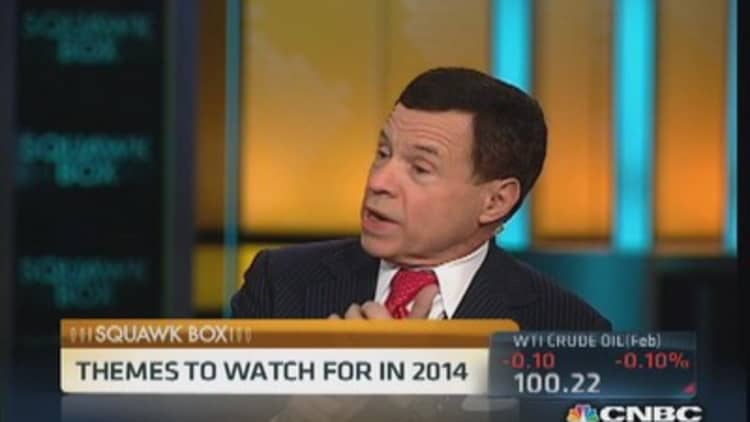Asia must navigate four big challenges in 2014 – inflation, interest rates, Japan's regional role and politics – all of which could dent investors' hopes for a cheery new year, HSBC said.
"Risks are finely balanced. For each positive, a significant challenge remains," said Frederic Neumann, HSBC's co-head of Asian economics research, in a note.
The lack of inflation is a key issue as it has been accompanied by a collapse in nominal gross domestic product growth, he said.
(Read more: Emerging markets get no love even as US bats up record highs)
Excess capacity has meant profit growth has suffered as margins were squeezed and capital spending could decline, Neumann said, adding as a follow-on effect, slower economic and corporate profit growth may impair the ability of governments, households and companies to service debt.
Low inflation has been a bugbear mainly in developed markets, with lower-than-expected inflation in the Eurozone spurring concerns over the region's nascent economic recovery. U.S. consumer prices were essentially flat in November.
Japan has struggled for decades against the pressures of deflation on its moribund economy. Abenomics – a series of policy measures unveiled under Prime Minister Shinzo Abe in April to jump start the economy – helped to spur the country to a 1.2 percent on-year rise in inflation in November, marking a five-year high.
Developed markets are key destinations for Asia's exports and slower growth will likely hurt demand.
The next concern is interest rates, Neumann said. U.S. Treasury yields have begun to creep upward as the Federal Reserve announced in December it would taper its asset purchases to $75 billion a month from the previous $85 billion.
Although markets initially convulsed when the Fed first broached the subject in May, Neumann said the actual announcement has been "well digested."
But he noted, "Weaker cash flow and higher debt expose emerging Asia to a possible spike in funding costs."
(Read more: Abenomics scorecard: 'A' for early initiative, 'C' for follow-through)
If the U.S. economy performs better than expected, the Fed many act more aggressively and higher interest rates wouldn't be offset by faster export shipments, he said.
In addition to concerns about the Fed, China officials' moves to restrain a debt build-up have pushed up interest rates there, posing harsh headwinds to more speculative parts of the economy, the note said.
China's National Audit Office reported this week that China's total public debt pile stands at 30.27 trillion yuan ($4.99 trillion) at the end of June, which analysts estimate equates to around 53 percent of gross domestic product (GDP).
(Read more: China's debt sentence, the biggest 'known, unknown' in 2014?)
Neumann's third concern is whether Japan's efforts to stimulate its economy will bear fruit for the rest of Asia.
While Japanese officials likely want their economic stimulus to remain within the country, it is an expensive place for companies to do business and an aging population can make it difficult to find workers.
After the Bank of Japan surprised markets in April with the announcement of huge monetary stimulus, there were hopes it would spur capital flows around the region, Neumann said.
"These were quickly dashed, however, when, among taper jitters abroad and a soaring equity market at home, Japanese investors stayed quiet," he said.
While Neumann expects this may change as Japanese banks seek market share in Southeast Asia and as its manufacturers increase foreign direct investment, any disappointment with Abenomics could derail these plans.

The fourth challenge for Asia in the new year is with its politics.
"Slower growth, declining productivity growth and ever-larger financial risks point to the need for far-reaching structural reforms to put the region's economies on a more sustainable path. This requires political determination," Neumann said.
Over the May-to-September period, Fed tapering fears spurred massive fund outflows from Asian markets. Countries with perceived imbalances, such as current account and fiscal deficits, including India, Indonesia and Thailand, were among the hardest hit, highlighting the need for economic adjustments.
Investors have been wary of excessive government spending, especially on subsidies, such as Thailand's multi-billion-dollar rice subsidy program and India's recent food subsidy bill.

(Read more: China's bad-loan skeletons to haunt markets)
But looming elections in India, Indonesia and Thailand may sap the will to make unpopular reforms, while other countries – such as Japan, the Philippines, Vietnam and Malaysia -- need to reassure investors that they will tackle "hard choices," he said.
In addition, while China appears determined to press ahead with its impressive reform agenda, the implementation could be "disruptive" to the country's growth, Neumann said.
Amid the challenges, "a sharp pick-up in Asian growth, already near a decade low, appears unlikely. On the other hand, a bigger slip-up, one that many had feared over the course of 2013, doesn't appear on the cards as well," he said. "Asia will thus deliver disappointing, if steady, growth."
—By CNBC.Com's Leslie Shaffer; Follow her on Twitter @LeslieShaffer1

